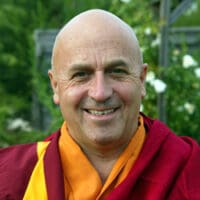Overview
The topic of consciousness is one that humans have wrestled with for centuries. How is consciousness related to material substrates, such as the brain and body? Christof Koch argued that the interactions of neuronal and sub-neuronal processes give rise not only to animal and human behavior but also to conscious experience. He discussed information theory, which assumes that any physical system that is sufficiently rich in information will have conscious experiences, and the content of those experiences depends on the exact nature of the causal interactions of the underlying components (e.g., neurons). Such theories can be empirically tested in animals, healthy people and brain-injured patients. Matthieu Ricard offered a Buddhist perspective, exploring consciousness as a primary phenomenon linked to matter, but also examining evidence that consciousness may not be contingent on matter. He also described how Buddhism transcends dualist views by suggesting that both material and non-material entities are devoid of intrinsic reality.
- Dialogue 2627 sessions
- January 20, 2013Drepung Monastery, Mundgod, India


